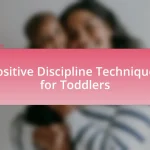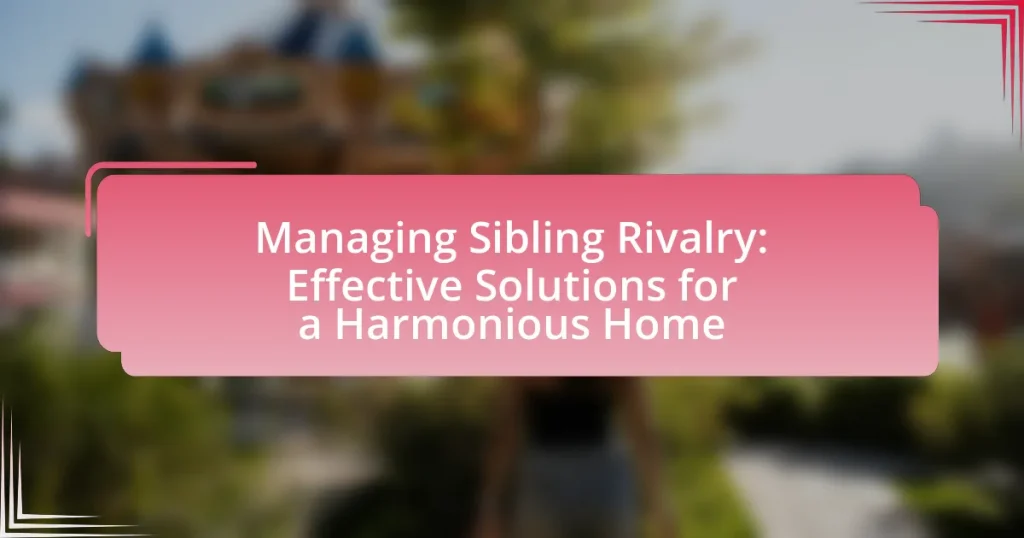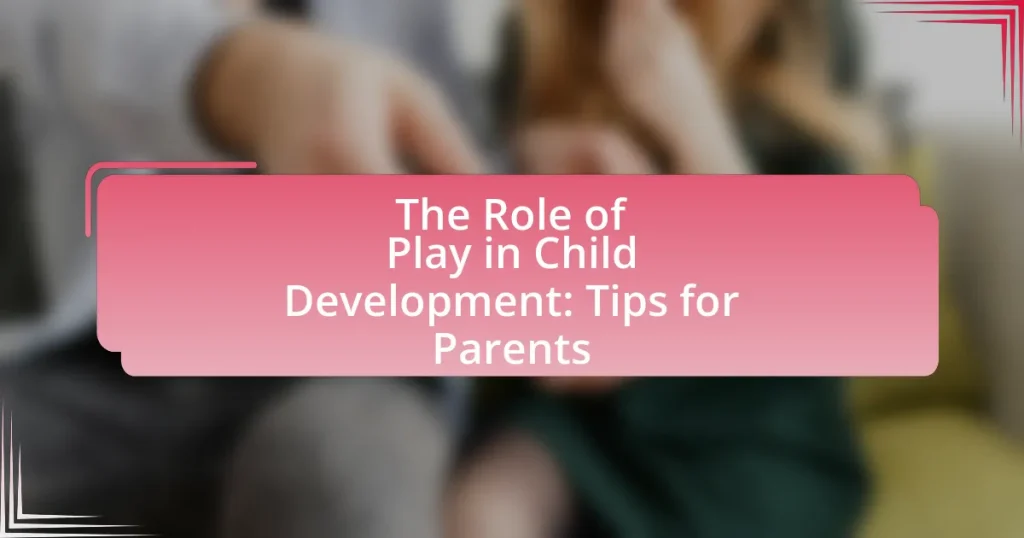Sibling rivalry refers to the competition or conflict between siblings, often driven by jealousy and the struggle for parental attention. This article explores the manifestations of sibling rivalry in children, including common behaviors and the influence of age differences. It examines the psychological factors and family dynamics that contribute to rivalry, as well as the potential negative impacts on emotional development and long-term relationships. Effective strategies for managing sibling rivalry, such as promoting teamwork, establishing clear rules, and fostering open communication, are discussed to help create a harmonious home environment. Additionally, the article highlights common mistakes parents should avoid and practical tips for strengthening sibling relationships.

What is Sibling Rivalry?
Sibling rivalry is the competition or conflict between siblings, often characterized by jealousy, resentment, and fighting. This phenomenon typically arises during childhood as siblings vie for parental attention, resources, and approval. Research indicates that sibling rivalry is a common aspect of family dynamics, with studies showing that approximately 70% of siblings experience some form of rivalry during their upbringing.
How does sibling rivalry manifest in children?
Sibling rivalry manifests in children through behaviors such as competition for parental attention, jealousy, and conflict over possessions or privileges. These behaviors often arise as siblings vie for recognition and resources, leading to arguments, physical altercations, or emotional distress. Research indicates that approximately 70% of siblings experience rivalry, which can peak during developmental stages such as toddlerhood and adolescence. This rivalry is a natural part of sibling relationships, reflecting underlying dynamics of attachment and social learning.
What are common behaviors associated with sibling rivalry?
Common behaviors associated with sibling rivalry include competition for parental attention, frequent arguments, and physical aggression. Siblings often vie for their parents’ approval, leading to jealousy and conflict. Research indicates that around 70% of siblings experience rivalry, which can manifest as name-calling, teasing, or even fighting over toys and privileges. These behaviors are typically more pronounced in families with close-age siblings, as they may compete for the same resources and recognition.
How do age differences influence sibling rivalry?
Age differences significantly influence sibling rivalry by affecting the dynamics of competition and comparison between siblings. For instance, a larger age gap often leads to one sibling being more mature and capable, which can create feelings of jealousy or inadequacy in the younger sibling. Research indicates that siblings with a two to three-year age difference may experience more rivalry due to overlapping developmental stages, while those with a five-year gap may have less direct competition, leading to different types of interactions. Additionally, older siblings may take on a caregiving role, which can mitigate rivalry but also create tension if the younger sibling resents this dynamic.
Why does sibling rivalry occur?
Sibling rivalry occurs primarily due to competition for parental attention and resources. Research indicates that siblings often vie for the same emotional and physical resources, leading to conflicts. A study published in the Journal of Family Psychology found that children perceive their parents’ attention as limited, which intensifies rivalry as they seek to secure their place in the family hierarchy. Additionally, differences in personality, age, and developmental stages can exacerbate these competitive feelings, further contributing to sibling rivalry.
What psychological factors contribute to sibling rivalry?
Psychological factors contributing to sibling rivalry include competition for parental attention, differences in personality traits, and perceived inequalities in treatment. Competition for parental attention often leads siblings to vie for affection and approval, which can escalate conflicts. Differences in personality traits, such as temperament and coping styles, can create friction as siblings may clash in their approaches to situations. Perceived inequalities in treatment, where one sibling feels favored over another, can foster resentment and rivalry. Research indicates that these dynamics are common in family systems, highlighting the need for equitable parenting strategies to mitigate rivalry.
How do family dynamics play a role in sibling rivalry?
Family dynamics significantly influence sibling rivalry by shaping the relationships and interactions among siblings. Factors such as parental favoritism, unequal distribution of resources, and differing parenting styles can exacerbate competition and conflict between siblings. Research indicates that when parents show favoritism, it can lead to feelings of resentment and jealousy, which intensify rivalry. For example, a study published in the Journal of Family Psychology found that perceived favoritism correlates with increased sibling conflict and lower sibling closeness. Thus, the structure and behavior within a family directly impact the nature and intensity of sibling rivalry.
What are the potential impacts of sibling rivalry?
Sibling rivalry can lead to various negative impacts on children, including emotional distress, behavioral issues, and impaired sibling relationships. Emotional distress often manifests as anxiety, low self-esteem, or feelings of inadequacy, as children may feel they are competing for parental attention and approval. Behavioral issues can include aggression, defiance, or withdrawal, which may disrupt family dynamics and affect social interactions outside the home. Additionally, unresolved sibling rivalry can result in long-term strained relationships, as siblings may carry resentment into adulthood, impacting their ability to communicate and support each other. Research indicates that 70% of siblings experience rivalry, highlighting its prevalence and potential for significant emotional and relational consequences.
How can sibling rivalry affect emotional development?
Sibling rivalry can negatively impact emotional development by fostering feelings of jealousy, insecurity, and low self-esteem in children. When siblings compete for parental attention or resources, they may experience heightened anxiety and stress, which can hinder their ability to form healthy emotional connections. Research indicates that children involved in frequent sibling conflicts are more likely to exhibit behavioral issues and emotional difficulties, such as aggression or withdrawal, as they struggle to navigate their relationships. A study published in the Journal of Family Psychology found that children with high levels of sibling rivalry reported lower levels of emotional well-being and social competence, highlighting the long-term effects of these rivalries on emotional growth.
What long-term effects can sibling rivalry have on relationships?
Sibling rivalry can lead to long-term effects such as strained relationships, decreased trust, and ongoing conflict among siblings. Research indicates that unresolved rivalry can result in emotional distance and resentment, impacting future interactions and family dynamics. A study published in the Journal of Family Psychology found that siblings who experienced high levels of rivalry in childhood were more likely to report negative feelings towards each other in adulthood, highlighting the lasting impact of these early conflicts on relational quality.
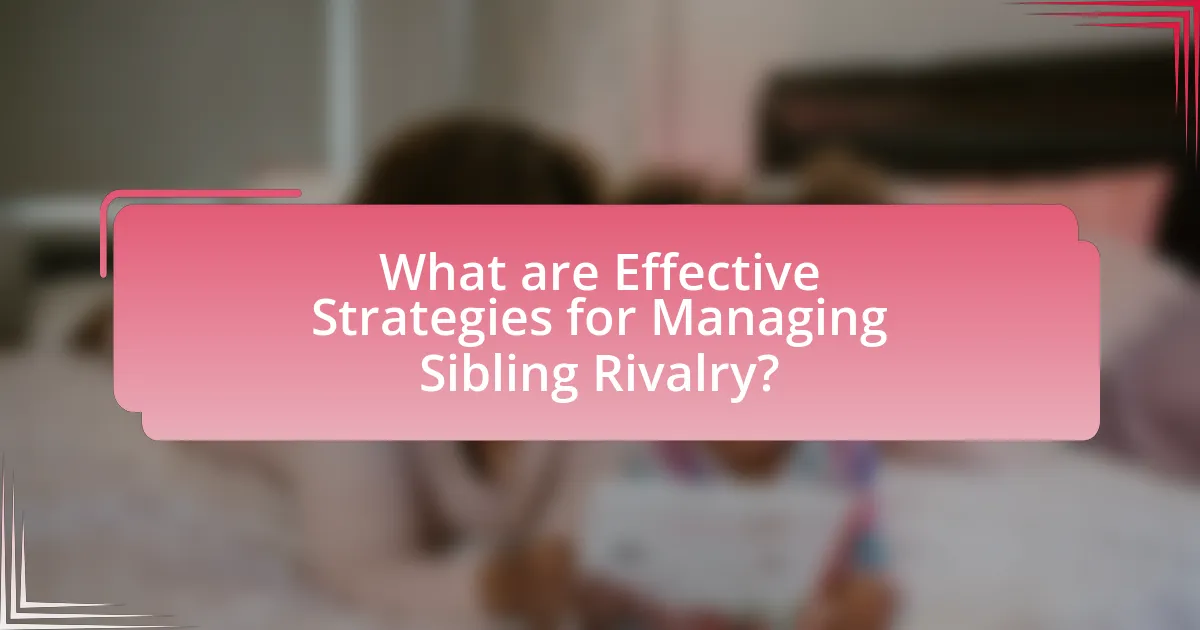
What are Effective Strategies for Managing Sibling Rivalry?
Effective strategies for managing sibling rivalry include promoting teamwork, establishing clear rules, and ensuring individual attention for each child. Promoting teamwork can involve engaging siblings in cooperative activities that require collaboration, which fosters positive interactions. Establishing clear rules helps set expectations for behavior and conflict resolution, reducing misunderstandings. Additionally, providing individual attention ensures that each child feels valued and reduces competition for parental affection. Research indicates that these strategies can significantly decrease conflict and improve sibling relationships over time, as evidenced by studies showing that children who engage in cooperative play exhibit less rivalry and more supportive behaviors.
How can parents foster a cooperative environment?
Parents can foster a cooperative environment by promoting open communication and encouraging teamwork among siblings. Establishing regular family meetings allows children to express their feelings and opinions, which enhances understanding and reduces conflicts. Additionally, assigning collaborative tasks, such as household chores or group projects, helps siblings learn to work together towards common goals. Research indicates that children who engage in cooperative activities develop better social skills and emotional intelligence, which are crucial for harmonious relationships.
What role does communication play in reducing rivalry?
Communication plays a crucial role in reducing rivalry by facilitating understanding and empathy between siblings. Effective communication allows siblings to express their feelings, needs, and concerns, which can help to clarify misunderstandings and reduce tensions. Research indicates that open dialogue fosters emotional intelligence, enabling siblings to navigate conflicts more constructively. For instance, a study published in the Journal of Family Psychology found that families who engage in regular, open communication experience lower levels of conflict and rivalry among siblings. This demonstrates that when siblings communicate effectively, they are more likely to resolve disputes amicably and strengthen their relationships.
How can parents encourage teamwork among siblings?
Parents can encourage teamwork among siblings by assigning collaborative tasks that require joint effort and communication. For instance, engaging siblings in household chores or group projects fosters a sense of shared responsibility and promotes problem-solving skills. Research indicates that children who work together on tasks develop better social skills and emotional intelligence, which are crucial for effective teamwork. By creating opportunities for siblings to cooperate, parents can help them build stronger relationships and reduce rivalry.
What techniques can be used to resolve conflicts?
Techniques to resolve conflicts include active listening, mediation, and establishing ground rules. Active listening involves fully concentrating on the speaker, which helps to understand their perspective and fosters empathy. Mediation, often facilitated by a neutral third party, allows siblings to express their feelings and negotiate solutions collaboratively. Establishing ground rules creates a framework for acceptable behavior during disputes, promoting respect and reducing escalation. These techniques are effective in managing sibling rivalry by encouraging communication and understanding, ultimately leading to a more harmonious home environment.
How can parents mediate disputes effectively?
Parents can mediate disputes effectively by actively listening to both sides, facilitating open communication, and guiding children toward a mutually acceptable resolution. Active listening involves giving each child the opportunity to express their feelings and perspectives without interruption, which fosters an environment of respect and understanding. Facilitating open communication means encouraging children to articulate their thoughts and emotions clearly, helping them to understand each other’s viewpoints. Additionally, guiding children toward a resolution can involve suggesting compromises or collaborative solutions that address the needs of both parties. Research indicates that effective mediation can reduce conflict and improve sibling relationships, as seen in studies highlighting the importance of parental involvement in conflict resolution (McHale et al., 2012, Journal of Family Psychology).
What are the benefits of teaching conflict resolution skills?
Teaching conflict resolution skills enhances interpersonal relationships and promotes emotional intelligence. These skills enable individuals, particularly children, to navigate disagreements constructively, reducing the likelihood of escalation into violence or resentment. Research indicates that children equipped with conflict resolution skills demonstrate improved social interactions and academic performance, as they can manage disputes effectively and maintain focus on learning. Furthermore, a study published in the Journal of Conflict Resolution found that teaching these skills leads to a significant decrease in behavioral issues among children, fostering a more harmonious home environment.
How can parents promote individual strengths?
Parents can promote individual strengths by recognizing and nurturing each child’s unique talents and interests. This involves observing their activities and providing opportunities for them to explore these strengths through tailored experiences, such as enrolling them in specific classes or encouraging hobbies that align with their abilities. Research indicates that children who receive support in developing their individual strengths are more likely to experience higher self-esteem and academic success, as highlighted in a study published in the Journal of Educational Psychology, which found that personalized encouragement leads to improved motivation and performance.
What strategies can help recognize each child’s unique talents?
To recognize each child’s unique talents, parents can implement observation, diverse activities, and open communication. Observing children during play and daily tasks allows parents to identify interests and strengths, such as creativity in art or problem-solving in puzzles. Engaging children in a variety of activities, including sports, music, and academic subjects, exposes them to different skills and helps highlight their natural inclinations. Open communication encourages children to express their interests and passions, providing insight into their unique talents. Research indicates that children thrive when their individual strengths are acknowledged and nurtured, leading to improved self-esteem and motivation.
How does celebrating individual achievements reduce rivalry?
Celebrating individual achievements reduces rivalry by fostering a sense of appreciation and recognition among siblings. When each child’s accomplishments are acknowledged, it shifts the focus from competition to support, encouraging a collaborative environment. Research indicates that positive reinforcement, such as celebrating achievements, can enhance sibling relationships by promoting empathy and reducing jealousy. For instance, a study published in the Journal of Family Psychology found that siblings who received individual praise were less likely to engage in rivalry behaviors, as they felt valued for their unique contributions rather than compared to one another.
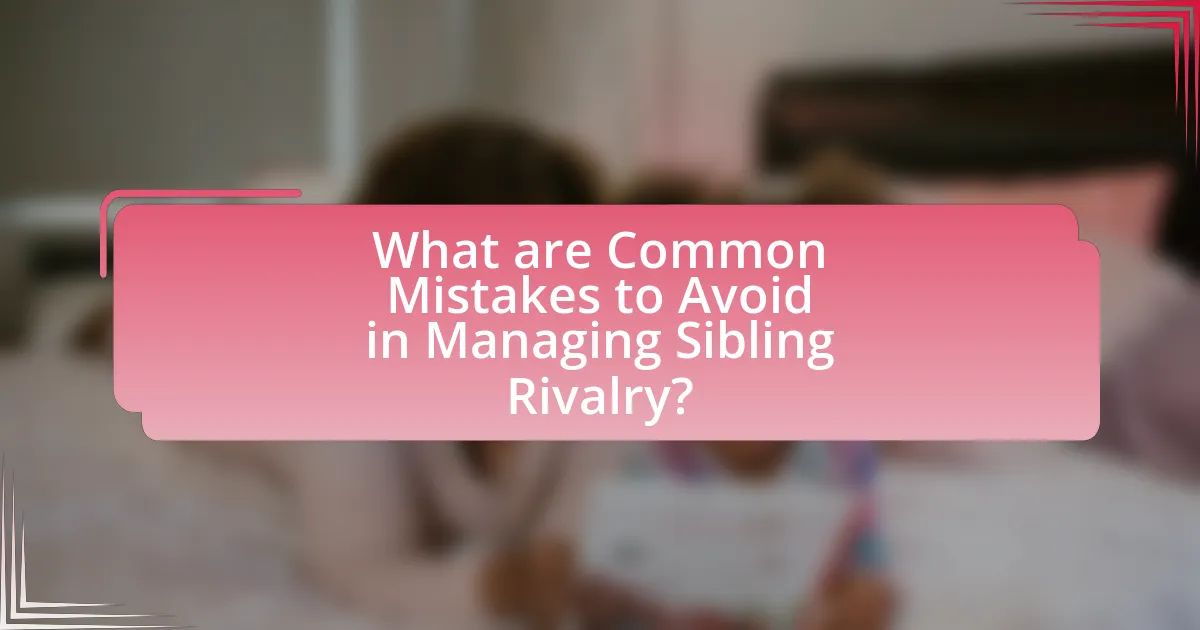
What are Common Mistakes to Avoid in Managing Sibling Rivalry?
Common mistakes to avoid in managing sibling rivalry include taking sides, failing to address the underlying issues, and not setting clear boundaries. Taking sides can exacerbate conflicts, as it fosters resentment and competition between siblings. Failing to address the underlying issues means that the root causes of rivalry, such as jealousy or lack of attention, remain unresolved, leading to ongoing disputes. Not setting clear boundaries allows behaviors to escalate, as siblings may feel free to act out without consequences. Research indicates that effective conflict resolution strategies, such as promoting open communication and encouraging empathy, can significantly reduce sibling rivalry and foster a more harmonious home environment.
What pitfalls should parents be aware of?
Parents should be aware of the pitfalls of favoritism, lack of communication, and inadequate conflict resolution strategies. Favoritism can lead to feelings of resentment and jealousy among siblings, which exacerbates rivalry. Research indicates that children who perceive unequal treatment are more likely to engage in negative behaviors towards each other (McHale et al., 2000). Lack of communication can prevent siblings from expressing their feelings and resolving conflicts, leading to misunderstandings and prolonged disputes. Additionally, inadequate conflict resolution strategies can result in unresolved issues that escalate over time, making it essential for parents to teach effective problem-solving skills.
How can favoritism exacerbate sibling rivalry?
Favoritism can exacerbate sibling rivalry by creating feelings of resentment and competition among siblings. When one child perceives that they are favored over their siblings, it can lead to jealousy and a desire to outdo each other for parental approval. Research indicates that children who feel less favored may exhibit increased aggression and conflict with their siblings, as they strive to gain recognition and validation. A study published in the Journal of Family Psychology found that perceived favoritism is linked to higher levels of sibling rivalry and conflict, demonstrating that unequal treatment can significantly impact sibling relationships.
What are the dangers of comparing siblings?
Comparing siblings can lead to significant emotional and psychological harm, including feelings of inadequacy and resentment. When parents or guardians frequently compare one sibling to another, it can foster a competitive environment that undermines self-esteem and creates rivalry rather than cooperation. Research indicates that children who are compared unfavorably may develop anxiety, depression, and a diminished sense of self-worth, as highlighted in a study published in the Journal of Family Psychology, which found that sibling comparisons negatively impact emotional well-being. Additionally, such comparisons can strain sibling relationships, leading to long-term conflicts and a lack of support among siblings.
How can parents avoid escalating conflicts?
Parents can avoid escalating conflicts by implementing clear communication strategies and setting consistent boundaries. Establishing open dialogue allows children to express their feelings and concerns, which can reduce misunderstandings that often lead to conflicts. Additionally, setting clear rules and consequences helps children understand acceptable behavior, minimizing the chances of disputes. Research indicates that families who engage in regular family meetings to discuss issues and solutions experience lower levels of conflict, as this practice fosters cooperation and understanding among siblings.
What are ineffective responses to sibling disputes?
Ineffective responses to sibling disputes include ignoring the conflict, which often allows resentment to build, and taking sides, which can exacerbate feelings of favoritism. Additionally, using punitive measures, such as harsh discipline, fails to teach conflict resolution skills and may lead to further animosity. Research indicates that these approaches do not address the underlying issues and can hinder healthy sibling relationships over time.
How can parents maintain neutrality during conflicts?
Parents can maintain neutrality during conflicts by actively listening to both sides without taking sides. This approach allows parents to understand each child’s perspective and fosters an environment where both feel heard. Research indicates that when parents remain impartial, it reduces the likelihood of escalating tensions and promotes conflict resolution skills among siblings. For instance, a study published in the Journal of Family Psychology found that parental neutrality can lead to better sibling relationships and improved emotional regulation in children. By focusing on understanding rather than judgment, parents can effectively manage sibling rivalry and encourage harmonious interactions.
What practical tips can help create a harmonious home?
To create a harmonious home, establish clear communication among family members. Open dialogue fosters understanding and reduces misunderstandings, which are common sources of conflict. Implementing regular family meetings can help everyone express their feelings and concerns, promoting a sense of belonging and teamwork. Additionally, setting boundaries and rules ensures that all family members know what is expected of them, which can minimize disputes. Research indicates that families who engage in structured communication and establish clear expectations experience lower levels of conflict and higher satisfaction in family relationships.
How can establishing family rules contribute to harmony?
Establishing family rules contributes to harmony by creating clear expectations and boundaries for behavior among family members. These rules help reduce conflicts by ensuring that everyone understands what is acceptable and what is not, thereby minimizing misunderstandings. Research indicates that families with established rules experience lower levels of conflict and higher levels of cooperation, as these guidelines foster a sense of security and predictability. For instance, a study published in the Journal of Family Psychology found that consistent family rules are associated with improved sibling relationships and overall family cohesion.
What daily practices can strengthen sibling relationships?
Daily practices that can strengthen sibling relationships include engaging in regular communication, participating in shared activities, and expressing appreciation for one another. Regular communication fosters understanding and connection, as siblings who talk openly about their feelings and experiences are more likely to resolve conflicts amicably. Participating in shared activities, such as playing games or collaborating on projects, builds teamwork and creates positive memories, reinforcing their bond. Expressing appreciation, whether through verbal affirmations or small gestures, enhances feelings of love and respect, which are crucial for a healthy sibling relationship. Research indicates that siblings who engage in positive interactions are more likely to develop strong, supportive relationships throughout their lives.






